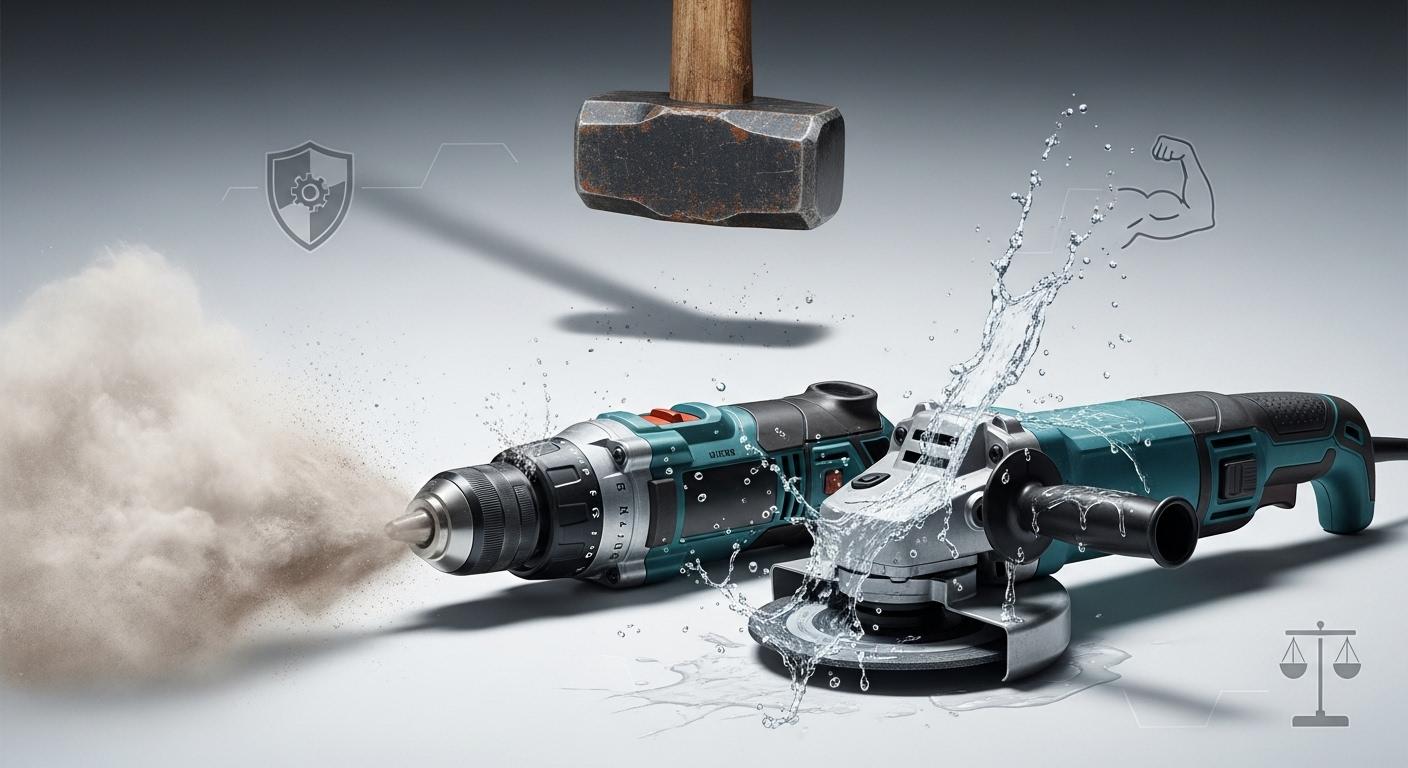 English
English 
 English
English 
Power tool testing ensures your tools are reliable, safe, and durable by evaluating endurance, dust, moisture, and impact resistance for lasting performance.

Power tools are built to handle tough jobs — but how can you be sure they'll last?
Power tool reliability testing evaluates how well a tool performs under stress, dust, moisture, and accidental drops. These tests ensure your tools stay durable, safe, and efficient — whether you’re a professional tradesperson or a DIY enthusiast.
Reliability testing helps identify how long tools last and how they perform in tough conditions.
Endurance, dust, moisture, and impact tests show how tools handle real-world challenges.
Choosing reliable tools reduces downtime, repairs, and replacement costs.
Power tool testing measures a tool's ability to perform safely and consistently over time. Instead of focusing only on certifications, these tests emphasize real-world reliability — ensuring the tool keeps working even under extreme use.
Manufacturers and users rely on these tests to evaluate tool performance, detect weak points, and ensure long-term durability.
Endurance testing checks how long a power tool can operate without failing.
Tools are often run for long hours or repeated cycles to simulate heavy-duty use. This test helps identify weak parts, overheating issues, and power loss.
Why it matters:
A tool that passes endurance testing can handle long work sessions without sudden breakdowns — ideal for professional or industrial use.
Tip:
If you often use tools for extended periods, choose models that have proven strong in endurance tests. It saves both time and repair costs.
Dust and moisture are two of the biggest threats to power tool performance.
Dust tests place tools in chambers filled with fine particles to see if debris enters the housing or motor.
Moisture tests expose tools to sprays or humid environments to ensure internal components stay dry.
Why it matters:
If you work outdoors, on construction sites, or in workshops, these tests ensure your tool keeps working in dirty or damp conditions.
Tip:
For outdoor jobs or woodworking, look for tools that mention dust-resistant or moisture-protected designs.
Accidents happen — tools fall. Impact resistance testing simulates drops from specific heights onto hard surfaces. The goal is to see if the housing cracks or internal parts fail.
Why it matters:
A tool that passes impact tests can survive real-life mishaps and keep working safely.
Tip:
If you often work at height or on-site, pick tools known for durable casings and strong build quality.
Reliable power tools also need safe electrical and battery systems.
Tests like short-circuit or overheat protection ensure that your tool and battery remain safe during use.
Battery packs are tested to ensure they don’t overheat or cause short circuits.
Good thermal design improves overall tool lifespan and user safety.
Tip:
If your tool smells like burning, sparks, or suddenly loses power, stop using it immediately. It could indicate an internal fault.
Watch for these early signs that your power tool may need attention:
The tool won't turn on (check battery, cord, or switch).
A burning smell or smoke during use.
Sparks or unusual noises from the motor.
Reduced power or inconsistent speed.
Ignoring these signs can lead to permanent damage or safety risks.
When reviewing a tool's specifications or test data, focus on the key performance areas:
| Test Type | What It Checks | Why It Matters |
| Endurance | Long-term performance | Prevents unexpected breakdowns |
| Dust/Moisture | Sealing and protection | Ensures reliability in tough environments |
| Impact | Drop resistance | Prevents damage during accidents |
| Battery | Heat and fault safety | Avoids overheating and fire risks |
Tip:
Even without official certifications, reliable tools often share test data or performance descriptions. Check user feedback or manufacturer reports for insights into real-world durability.
Power tool reliability testing isn't just about passing certifications — it's about real performance and durability.
By understanding endurance, dust, moisture, and impact testing, you can choose tools that handle your work environment and stay dependable for years.
Whether you're a professional or a DIYer, investing in tools that prove their reliability through testing helps you work safer, smarter, and longer.
Hebei Sinotools Industrial Co., LTD.
Copyright © Sinotools Industrial All rights reserved. Technical Support:REANOD